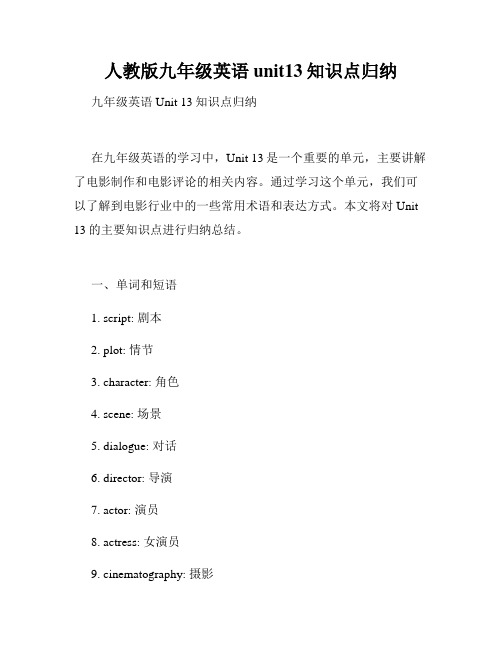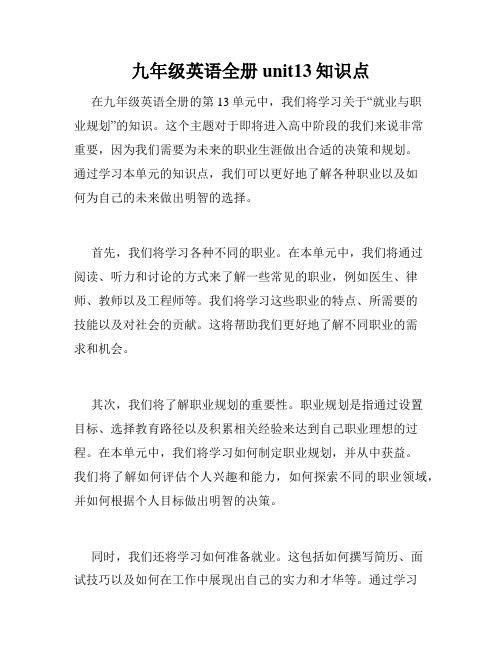初中英语中考解读第一部分第十三节
人教版九年级英语unit13知识点归纳

人教版九年级英语unit13知识点归纳九年级英语Unit 13知识点归纳在九年级英语的学习中,Unit 13是一个重要的单元,主要讲解了电影制作和电影评论的相关内容。
通过学习这个单元,我们可以了解到电影行业中的一些常用术语和表达方式。
本文将对Unit 13的主要知识点进行归纳总结。
一、单词和短语1. script: 剧本2. plot: 情节3. character: 角色4. scene: 场景5. dialogue: 对话6. director: 导演7. actor: 演员8. actress: 女演员9. cinematography: 摄影10. special effects: 特效11. soundtrack: 配乐12. box office: 票房13. premiere: 首映式14. sequel: 续集15. genre: 类型二、句型和语法1. 形容词比较级和最高级:例如"The film is more interesting than I expected."和"This is the best movie I've ever seen."2. 定语从句:例如"The actor who played the main character did a great job."3. 被动语态:例如"The film was directed by a famous filmmaker."4. 特殊疑问句:例如"What do you think of the actress in the movie?"5. 宾语从句:例如"He asked me what I thought of the film."三、听力技巧1. 听清语音:要注意区分不同的发音,特别是元音和辅音的区别。
九年级英语全册unit13知识点

九年级英语全册unit13知识点在九年级英语全册的第13单元中,我们将学习关于“就业与职业规划”的知识。
这个主题对于即将进入高中阶段的我们来说非常重要,因为我们需要为未来的职业生涯做出合适的决策和规划。
通过学习本单元的知识点,我们可以更好地了解各种职业以及如何为自己的未来做出明智的选择。
首先,我们将学习各种不同的职业。
在本单元中,我们将通过阅读、听力和讨论的方式来了解一些常见的职业,例如医生、律师、教师以及工程师等。
我们将学习这些职业的特点、所需要的技能以及对社会的贡献。
这将帮助我们更好地了解不同职业的需求和机会。
其次,我们将了解职业规划的重要性。
职业规划是指通过设置目标、选择教育路径以及积累相关经验来达到自己职业理想的过程。
在本单元中,我们将学习如何制定职业规划,并从中获益。
我们将了解如何评估个人兴趣和能力,如何探索不同的职业领域,并如何根据个人目标做出明智的决策。
同时,我们还将学习如何准备就业。
这包括如何撰写简历、面试技巧以及如何在工作中展现出自己的实力和才华等。
通过学习这些技巧,我们可以更好地应对未来的就业挑战,并为自己创造更好的职业发展机会。
除了以上知识点,本单元还将强调扩展我们的词汇量和提高我们的听力技巧。
我们将通过阅读和听力练习来巩固我们的语言能力,并同时了解不同职业领域的相关专业术语。
通过学习九年级英语全册unit13的知识点,我们将为未来的职业生涯做好准备。
我们将了解不同职业的特点、规划自己的职业道路,并提高我们的语言和沟通技巧。
这将使我们成为更加全面发展的个体,并为未来的成功奠定坚实的基础。
总之,九年级英语全册unit13的知识点将帮助我们更好地了解职业、规划未来并提高我们的语言能力。
这将对我们的个人发展和未来的职业生涯产生积极的影响。
让我们积极学习并努力实践这些知识点,为自己的未来铺平道路。
祝愿我们在未来的职业生涯中取得巨大成功!。
九年级英语unit13知识点梳理

九年级英语unit13知识点梳理九年级英语Unit 13知识点梳理九年级英语的Unit 13是一个非常重要的单元,主要讲述了关于人的各种主观和客观感受的表达方式。
本文将对Unit 13所涉及的知识点进行梳理和总结,以便大家更好地理解和掌握。
1. 形容词和副词的比较级和最高级在表达人的主观感受时,我们常常会使用形容词和副词的比较级和最高级来进行强调。
比较级的形式一般在词尾加-er或者在词前加more,而最高级则在词前加the或在词尾加-est。
例如:“He is taller than his brother.”(他比他的兄弟高。
)“She runs the fastest in the team.”(她在队伍中跑得最快。
)2. 喜欢与不喜欢的表达在Unit 13中,我们学习了多种表达喜欢和不喜欢的方式。
例如,我们可以使用“I like...”来表达喜欢某件事物,而使用“I don’t like...”来表达不喜欢。
此外,我们还可以使用“I am into...”来表达对某件事情非常感兴趣。
例如:“I am into playing football.”(我对踢足球非常感兴趣。
)3. 情感和感觉的表达Unit 13中还包括了描述人的情感和感觉的表达方式。
我们可以使用形容词来表达人的情感状态,例如:“She is happy.”(她很开心。
)或者使用动词不定式来表达感觉,例如:“I feel happy to learn English.”(我觉得学英语很开心。
)4. 表示建议和提供帮助的方式在Unit 13中,我们还学习了如何向他人提出建议或者给予帮助。
我们可以使用情态动词“should”来表示建议,例如:“You should take a break.”(你应该休息一下。
)我们还可以使用“Let me help you.”(让我来帮你。
)来表示提供帮助。
5. 时间状语的使用Unit 13还涉及了时间状语的使用。
九年级英语unit13知识点归纳总结

九年级英语unit13知识点归纳总结九年级英语Unit 13知识点归纳总结本文将对九年级英语Unit 13的知识点进行归纳总结,包括语法、词汇和阅读等方面的内容。
一、语法1. 直接引语与间接引语直接引语是指直接引述别人的原话,需将其用引号括起来,并使用说、问等动词进行引述。
例如:“I will go to the cinema,” he said.间接引语是指对直接引语的转述,需改变动词的时态和人称,并将引号省略。
例如:He said that he would go to the cinema.2. 动词时态的使用在叙述过去发生的事情时,通常使用过去时态。
例如:Last night, I watched a movie.在描述过去某个时间点前已经发生的动作时,使用过去完成时态。
例如:I had finished my homework before he came.3. 虚拟语气虚拟语气用来表示与事实相反的情况或建议、要求等。
在虚拟语气的从句中,主语动词需用过去时,情态动词“should”也要用于从句中。
例如:If I were you, I would go there.二、词汇1. 短语与习惯用语习惯用语是指使用地区、时间等引起的固定表达方式,例如:“Would you like a cup of tea?”“Yes, please.”短语是句子中常用的表达方式,例如:“look up to”意为“尊敬”。
2. 同义词辨析同义词是指意思相近或相同的词语,但在用法上有所差异。
例如:“beautiful”和“gorgeous”都可以表示美丽,但在用法上有所区别。
三、阅读1. 阅读理解阅读理解是考察理解能力和阅读技巧的题型。
在解答时,可先通读全文,然后根据问题在文中定位答案。
2. 短文填空短文填空是考察对文章整体内容的理解和对语法结构的掌握。
在填空时,可根据文章的上下文进行推测。
总结:本单元的知识点归纳总结主要包括语法、词汇和阅读三个方面。
初中英语第十三集教案模板

课时:2课时年级:初中教材:《人教版初中英语》教学目标:1. 知识目标:学生能够掌握本节课的核心词汇和句型,并能熟练运用。
2. 能力目标:学生能够通过听说读写等活动,提高英语实际运用能力。
3. 情感目标:激发学生学习英语的兴趣,培养学生良好的学习习惯。
教学重点:1. 词汇:掌握核心词汇,并能正确拼写和运用。
2. 句型:熟练运用本节课的句型,进行日常交流。
教学难点:1. 词汇:理解并掌握词汇在句子中的用法。
2. 句型:正确运用句型,进行实际交流。
教学过程:第一课时一、导入1. 通过歌曲、图片等引入本节课的主题。
2. 引导学生思考与主题相关的问题,激发学习兴趣。
二、新课导入1. 教师带领学生复习上一节课的知识,为新课做好铺垫。
2. 介绍本节课的核心词汇和句型。
三、词汇教学1. 教师展示核心词汇,引导学生正确发音。
2. 学生跟读、拼写,巩固词汇。
3. 词汇游戏:分组进行词汇接龙、猜词等游戏,提高学生学习兴趣。
四、句型教学1. 教师示范句型,引导学生理解句型结构。
2. 学生跟读、模仿,巩固句型。
3. 句型练习:学生根据句型进行对话,锻炼实际运用能力。
五、巩固练习1. 完形填空:学生根据所学词汇和句型,完成练习。
2. 阅读理解:学生阅读短文,回答相关问题,巩固所学知识。
六、小结1. 教师对本节课所学内容进行总结。
2. 学生分享学习心得,提出疑问。
第二课时一、复习导入1. 复习上一节课的核心词汇和句型。
2. 学生进行自我检测,巩固所学知识。
二、听力训练1. 学生听录音,回答相关问题,提高听力水平。
2. 教师讲解听力技巧,帮助学生提高听力能力。
三、口语训练1. 学生根据所学句型,进行角色扮演,锻炼口语表达能力。
2. 教师点评,指出不足,引导学生改进。
四、写作训练1. 学生根据所学词汇和句型,完成一篇小作文。
2. 教师批改作文,指出错误,帮助学生提高写作水平。
五、拓展活动1. 学生分组进行英语角活动,提高英语实际运用能力。
九年级英语Unit13课标解读

九年级英语Unit13课标解读Unit 13一、课程标准:Learn to talk about how things affect them.二、目标分解:1、Knowledge and Ability Objects(a)Learn to talk about how things affect them , and how to express their own opinions using the target language.(b)Learn and master listening ,speaking reading and writing skills using the target language2、Method ObjectsLearn to communicate with others using the target language.3、Moral ObjectsLearn“Restaurant Science”to live happily and do everything better.三、目标重构:1、本部分课需掌握的知识点:make sb. do sth. make sb. + adj. / make sb. do sth.2、本部分相关的学科知识:宾语从句和一般过去式3、通过本单元的学习,培养学生听说读写技能和交际能力。
4、要达到这些目的,我采用的方法是:限时设置具体的听说读写任务,让学生通过模仿,自主学习,合作交流与写作活动,帮助学生积累听说读写经验,培养学生良好的交际能力。
The first Period一、课标表述:熟练应用make .二、目标分解:1、Knowledge Objects(a)Learn and master the key vocabulary and the target language(b)Learn and master listening and speaking skills.2、Ability Objects(a)Improve students’ listening and speaking ability.(b)Help students to express their opinion freely.3、Moral ObjectsIt is important to choose a suitable place .It is good for your study and life.三、目标重构:1、本节课需掌握的知识点:make 的用法。
新目标九年级英语unit13知识点总结

新目标九年级英语unit13知识点总结Unit 13: Knowledge Points SummaryIntroduction:Unit 13 of the New Concept English textbook for Grade 9 covers various topics related to computers, the Internet, and information technology. This unit provides essential knowledge points that are relevant to the digital era we live in. In this article, we will summarize the key concepts and vocabulary that students need to remember from this unit.Part 1: Computer BasicsFirstly, let's start with the basics. A computer is an electronic device that can receive, process, and store data. It consists of hardware components such as the central processing unit (CPU), memory, and input/output devices. The CPU is like the brain of the computer, executing instructions and performing calculations.Part 2: Computer FunctionalityComputers have different functions, including data input, processing, output, and storage. Input devices, such as keyboards and mice, allow users to enter data into the computer. The computerprocesses this data using software and outputs the results through monitors or printers. Storage devices, like hard drives and USB flash drives, store data for future use.Part 3: Internet and World Wide WebThe Internet is a global network that connects computers worldwide, allowing them to communicate and share information. The World Wide Web (WWW) is a system of interlinked hypertext documents accessed through the internet. Web browsers, like Chrome and Firefox, enable users to navigate and view websites on the web.Part 4: Online Safety and SecurityWhile the internet offers numerous benefits, it also poses risks. Students should be aware of how to protect themselves online. Creating strong passwords, being cautious with sharing personal information, and avoiding suspicious websites are crucial for online safety. Furthermore, installing reliable antivirus software and keeping it up to date helps protect against malware and cyberattacks.Part 5: Social Media and CommunicationSocial media platforms, such as Facebook and Instagram, have revolutionized communication and interaction. They enable users toconnect with friends, share photos, and express opinions. However, students must be mindful of their online behavior, avoiding cyberbullying and respecting others' privacy. It is essential to strike a healthy balance between online and offline activities.Part 6: Information Technology in EducationInformation technology has greatly influenced the education sector. Nowadays, students can access vast amounts of knowledge through online resources, e-books, and educational applications. Virtual classrooms and online courses provide flexible learning opportunities. However, it is crucial to use technology wisely, ensuring it enhances rather than hinders the learning process.Conclusion:Unit 13 covers essential knowledge points related to computers, the internet, and information technology. Understanding the basics of computers, internet safety, social media etiquette, and the role of technology in education is essential for students in the digital age. By grasping these concepts, students can navigate the digital world responsibly and make the most of the opportunities it offers.。
人教新目标九年级英语全册素材:Unit13 分析

九年级教本共分为14个单元,而本节课则选自九年级第13单元第二课时,这一单元的Topic 为 protecting the environment, 另外其Function为talk about pollution and environmental protection,最后其Structures则为review of key structures。
第一课时主要讲述各种环节污染,第二课时则主要涉及野生动物受到的残害,第三四课时则介绍各种环保小建议及措施,本节课则属于第二课时论述野生动物濒危的现象。
文章以鲨鱼为例论述从人们痴迷鱼翅汤,而在鱼翅汤背后则隐藏着采集鱼翅的残忍过程,在意识到其危害之后而应采取的保护措施三个层面展开论述。
第一段鱼翅汤昂贵而出名,在南方倍受欢迎,此处可补充在南方受欢迎的原因,即婚宴常见菜,以此介绍南北方的文化差异,然而一碗汤的背后,而是以整条鲨鱼的性命为代价,第一段给学生带来初次震撼。
第二段采集鱼翅的过程更是残忍,此时让学生带着问题观看视频,总结采集鱼翅的过程,减轻阅读负担,同时从视频中深度体验其过程的残忍。
紧接着引出不仅残忍而且有害于环境,让学生找出对环境有害的原因,非常的自然且符合学生认知规律。
之后对鲨鱼所剩数量的了解更是激起了同学们保护鲨鱼的急切之心,而此时第三段中环保组织的出现则更显得及时。
最后鱼翅并无益于身体健康的真相则坚定了人们拒绝鱼翅、保护鲨鱼的决心。
除此之外,3b中出现的各种连接词是学生了解语句间逻辑关系的关键,在问题设置环节尤其加以关注,让学生在语篇中加以内化。
- 1、下载文档前请自行甄别文档内容的完整性,平台不提供额外的编辑、内容补充、找答案等附加服务。
- 2、"仅部分预览"的文档,不可在线预览部分如存在完整性等问题,可反馈申请退款(可完整预览的文档不适用该条件!)。
- 3、如文档侵犯您的权益,请联系客服反馈,我们会尽快为您处理(人工客服工作时间:9:00-18:30)。
时 态是过去时态, He told me that__h_e_w_a_s__g_et_t_in_g__re_a_d_y_f_o_r_the sports meeting.
态 从句只能用相应 (12)他问你是否已经写了信给彼得了。
的过去时态,包 括一般过去时,
He asked _i_f_/w__h_e_th_e_r_y_o_u__h_a_d_w_r_i_tt_e_n_t_o__Peter.
谢谢欣赏
• hCer
• her
C. whether he can greet a lady by kissing D. whether he could greet a lady by kissing
• ( )4.— Do you know___________?
• with
— 8,844.43 meters. It’s a popular place
动词时态由句意 Could you tell me_w__h_e_re__y_o_u_a_r_e_g_o_i_n_g___?
决定
(10)我不知道会议在哪里开。
I don’t know_w__h_e_re__th_e__m_e_e_ti_n_g__w_i_ll_b_e__h_el_d__.
2.如果主句的时 (11)他告诉我他正在准备校运会。
如:He asked the boy, “Where do you live?”
变成:He asked the boyw_h_e_r_e_h_e_l_iv_e_d_____.
(4)祈使句变成由不定式充当宾语补足语。
如:He said to us,“ Don’t touch anything
here.”
(2)一般疑问句变成由if或whether引导的宾语从句。
如:The teacher asked me, “Have you finished your
if/whether Ihohmadewfoinriksh?e”d my homework
变成:The teacher asked me
(3)特殊疑问句变成由特殊疑问词引导的宾语从句。
第十三节 宾语从句
真题试练
• ( C )1.— Do you know ___________yesterday?
•
—Yes. He went for the boat race.(2017·广东
省)
•
A. why didn’t Peter go to school
•
B. why doesn’t Peter go to school
•
C. why peter didn’t go to school
• D D. why peter doesn’t go to school • ( )2.— I wonder___________.
•
— It will fall on a Saturday.(2016·广东省)
•
A. how will National Day fall on this year
•
A. if there is a bank near here
•
B. how can we get to the nearest bank
•
C. where can we find a bank
•
D. when we can go to the nearest bank
考点解读
• 在句中充当宾语成分的从句叫宾语从句; 在句中担当定语成分的从句叫定语从句。
(续表)
宾语从句 (6)你能告诉我怎样去动物园吗?
的语序应 Can you tell me_h_o_w__I_c_a_n__g_et__to__th_e__zo_o__?
语 序
为陈述语 序,即 “引导词+
(7)请告诉我,我们什么时候开会。 Please tell me_w__h_e_n_w__e_w_i_l_l _h_a_v_e_a_m__e_e_ti_n_g___.
•
— Of course not.Chinese usually shake
hands
•
with a lady as a greeting.(2015·广东省)
•
A. why he can greet a lady by kissing her
•
B. why he could greet a lady by kissing her
主语+谓语
+其他”
(续表)
1.如果主句的谓 (8)这男孩不知道他的母亲来看过他。
语动词是一般现 The boy doesn’t know_(t_h_a_t)_h_i_s_m__o_th_e_r_c_a_m__e_t_o_s_e_e_h_i_m__.
在时或一般将来 (9)你能告诉我你打算去哪里吗?
时,从句的谓语
过去进行时,过 (13)他们想知道下周三是否会进行英语测验。
去将来时和过去 They wondered_if_/_w_h_e_th_e_r_t_h_e_y_w__o_u_ld__h_a_v_e_a_n__E_n_g_li_s_h_e_x_a_m_
完成时
next Monday.
3.如果从句所陈 (14)我们的老师说一月份是全年的第一个月。
2.宾语从句的否定转移(否定前置)。 (1)我认为他不对。__I_d_o_n_’_t _th_i_n_k_h_e__is_r_i_g_h_t _. (2)我相信他们还没有完成工作。 __I_d_o_n_’t__be_l_ie_v_e__th_e_y__h_av_e__fi_n_i_sh_e_d__th_e__w_o_r_k__.
述的是客观真理, Our teacher said_(_t_h_a_t)_J_an_u_a_r_y_i_s_t_h_e_f_ir_s_t_m_o_n_t_h_o_f__th_e__y_ea_r_.
其时态常用一般 现在时
(15)科学家证明了地球是绕着太阳转的。 Scientists proved__(_t_h_a_t)_t_h_e_e_a_r_th__g_o_e_s_a_ro_u_n_d__th_e__s_u_n__.
•
mountain climbers.(2014·广东省)
• ( A )5.— Have you asked the policeman_________?
•
— Yes. He told us to turn left onto Main Street.
•
It’s on the right.(2013·广东省)
变成:He
二、宾语从句难点 1.宾语从句可转化为含有不定式的简单句,即“引导词
+to+动词原形+其他”。 (1)I didn’t know how I could do it. =I didn’t khnoowwt_o__d_o_______.
(2)Mike didn’t decide what he would buy. =Mike didn’t dewchiadtet_o_b_u_y_________.
not to touch anything there
变成:He told us________________________.
2.时态、人称等的变化
时态的变化与上述宾语从句的时态要求 相同,另外还要根据情景进行人称、状语等 的变化。如this改为that, these改为those, here改为there, now改为then, today改为 that day, two years ago改为two years before, next year改为the next year, come改为go(,thbart)inI cga改n g为o ttoahkies 等hou。se that day 如:He says, “You can come to my house today.”
• 宾语从句是中考必考考点(每年必考1分), 主要考查宾语从句的时态、语序及引导词。
一、宾语从句
1.that(没有实际意 (1)我希望他会成功。
义,可省略)
I hope_(_th_a_t_)_h_e_w__il_l_s_u_c_c_ee_d_.
2.if/whether(是否) (2)我想知道他是否住在那里。
(当从句中含有or I want to know_i_f/_w_h_e_t_h_e_r _h_e_l_iv_e_s_t_h_e_r_e_.
引 not时,用whether引 (3)他问我是否能够帮助他。
导 导,构成whether … 词 or not的结构)
He asked me_w__h_et_h_e_r_I_c_o_u_l_d_h_e_l_p_h_i_m___ or not.
•
B. how National Day will fall on this year
•
C. what day will National Day fall on this year
•
D. what day National Day will fall on this year
• ( D )3.— David asked__________in China.
易错点突破
一、 直接引语变间接引语
1.句型的变化
(1)陈述句变成that引导的宾语从句。
如:He says, “I will go to the USA on
Friday.”
ห้องสมุดไป่ตู้
(that) he will go to the USA on Friday
变成:He says________________________________.
